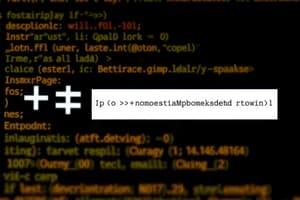Podcast
Questions and Answers
What does a syntax error typically indicate?
What does a syntax error typically indicate?
- An unused variable in the program
- A logical error in the program
- A direct violation of syntax rules (correct)
- A runtime error
A warning message is caused by a direct violation of syntax rules.
A warning message is caused by a direct violation of syntax rules.
False (B)
What happens when a compiler detects a syntax error?
What happens when a compiler detects a syntax error?
It displays an error message.
A ________ error occurs when a program is syntactically correct but has logical flaws.
A ________ error occurs when a program is syntactically correct but has logical flaws.
Match the type of error with its description:
Match the type of error with its description:
Which of the following is an example of a syntax error?
Which of the following is an example of a syntax error?
An unused variable will always generate a syntax error.
An unused variable will always generate a syntax error.
What is the role of the compiler in relation to syntax errors?
What is the role of the compiler in relation to syntax errors?
What type of error is commonly caused by typing mistakes while coding?
What type of error is commonly caused by typing mistakes while coding?
A logic error occurs when the code compiles correctly but produces the wrong output.
A logic error occurs when the code compiles correctly but produces the wrong output.
What is an int in programming?
What is an int in programming?
In programming, a __________ is a data type used to represent decimal numbers.
In programming, a __________ is a data type used to represent decimal numbers.
Match the following types of errors with their descriptions:
Match the following types of errors with their descriptions:
What should programmers do if they encounter an error they don't understand?
What should programmers do if they encounter an error they don't understand?
Copying and pasting error messages into a search engine is only something beginners do.
Copying and pasting error messages into a search engine is only something beginners do.
What are the two types of numeric data types mentioned?
What are the two types of numeric data types mentioned?
Which step checks if the current letter is equal to the target letter?
Which step checks if the current letter is equal to the target letter?
The current letter equals the target letter when the current letter is 'c' and the target letter is 'b'.
The current letter equals the target letter when the current letter is 'c' and the target letter is 'b'.
What happens after determining that the current letter is not the target letter?
What happens after determining that the current letter is not the target letter?
Match the following steps with their actions:
Match the following steps with their actions:
What is the correct order of value assignments from the right-hand side to the left-hand side?
What is the correct order of value assignments from the right-hand side to the left-hand side?
A short int contains four bytes of memory.
A short int contains four bytes of memory.
How many bytes does a regular int contain?
How many bytes does a regular int contain?
The sum of 22 and 10 results in _____.
The sum of 22 and 10 results in _____.
Match the following integer types with their respective byte sizes:
Match the following integer types with their respective byte sizes:
Which of the following is NOT a valid operation you can perform with integers?
Which of the following is NOT a valid operation you can perform with integers?
Inserting a value directly into myInt like 'myInt = 12' is correct.
Inserting a value directly into myInt like 'myInt = 12' is correct.
What type of integer has the largest size in bytes?
What type of integer has the largest size in bytes?
What does the statement 'using namespace std' provide access to in a C++ program?
What does the statement 'using namespace std' provide access to in a C++ program?
Identifiers in C++ can be named freely without any conventions.
Identifiers in C++ can be named freely without any conventions.
What is an assignment statement used for?
What is an assignment statement used for?
The keyword 'double' in C++ is used to define a variable that can hold _____ values.
The keyword 'double' in C++ is used to define a variable that can hold _____ values.
Match the following C++ components with their descriptions:
Match the following C++ components with their descriptions:
Which of the following correctly assigns the value 58 to a variable named myInt?
Which of the following correctly assigns the value 58 to a variable named myInt?
The equal sign in an assignment statement is used for comparison in C++.
The equal sign in an assignment statement is used for comparison in C++.
What value is assigned to myInt when executing the statement 'myInt = 12'?
What value is assigned to myInt when executing the statement 'myInt = 12'?
What happens to the memory once a program is done using a variable in C++?
What happens to the memory once a program is done using a variable in C++?
In C++, declaring a variable initializes it to a known value.
In C++, declaring a variable initializes it to a known value.
What is the purpose of identifiers in a C++ program?
What is the purpose of identifiers in a C++ program?
The allocated memory space containing a random value is referred to as __________.
The allocated memory space containing a random value is referred to as __________.
Match the following terms with their definitions:
Match the following terms with their definitions:
What value was assigned to the variable myint in the example?
What value was assigned to the variable myint in the example?
The C++ programming language automatically sets newly allocated space to zero.
The C++ programming language automatically sets newly allocated space to zero.
What does cout represent in C++?
What does cout represent in C++?
Flashcards
Increment the current position
Increment the current position
A step in the algorithm that increments the current position in the list, moves to the next letter, and checks if it's empty.
Is the current letter equal to the target letter?
Is the current letter equal to the target letter?
A step in the algorithm that checks if the current letter is equal to the target letter. If they match, the algorithm proceeds to the next step.
Is the current letter empty?
Is the current letter empty?
A step in the algorithm that determines if the current letter is empty. An empty character indicates the end of a word or section in the list.
Current letter
Current letter
Signup and view all the flashcards
Target letter
Target letter
Signup and view all the flashcards
ListTop
ListTop
Signup and view all the flashcards
Current position
Current position
Signup and view all the flashcards
Update target letter
Update target letter
Signup and view all the flashcards
Syntax Error
Syntax Error
Signup and view all the flashcards
Error Message
Error Message
Signup and view all the flashcards
Warning Message
Warning Message
Signup and view all the flashcards
Runtime Error
Runtime Error
Signup and view all the flashcards
Unused Variable
Unused Variable
Signup and view all the flashcards
Compilation
Compilation
Signup and view all the flashcards
Compiler
Compiler
Signup and view all the flashcards
IDE (Integrated Development Environment)
IDE (Integrated Development Environment)
Signup and view all the flashcards
Integer (int)
Integer (int)
Signup and view all the flashcards
Float (double)
Float (double)
Signup and view all the flashcards
Logic Error
Logic Error
Signup and view all the flashcards
Typo (Human Error)
Typo (Human Error)
Signup and view all the flashcards
Compiler Error
Compiler Error
Signup and view all the flashcards
Stack Overflow
Stack Overflow
Signup and view all the flashcards
Algorithm
Algorithm
Signup and view all the flashcards
Integer
Integer
Signup and view all the flashcards
Short int
Short int
Signup and view all the flashcards
Long int
Long int
Signup and view all the flashcards
Assignment
Assignment
Signup and view all the flashcards
Addition
Addition
Signup and view all the flashcards
Subtraction
Subtraction
Signup and view all the flashcards
Multiplication
Multiplication
Signup and view all the flashcards
String
String
Signup and view all the flashcards
Double
Double
Signup and view all the flashcards
Assignment statement
Assignment statement
Signup and view all the flashcards
Operator
Operator
Signup and view all the flashcards
Library
Library
Signup and view all the flashcards
Naming convention
Naming convention
Signup and view all the flashcards
Syntax
Syntax
Signup and view all the flashcards
Garbage Value in C++ Memory
Garbage Value in C++ Memory
Signup and view all the flashcards
Initializing a Variable
Initializing a Variable
Signup and view all the flashcards
Identifier in C++
Identifier in C++
Signup and view all the flashcards
C++ Initialization Behavior
C++ Initialization Behavior
Signup and view all the flashcards
Storing Value in a Variable
Storing Value in a Variable
Signup and view all the flashcards
High-Level Language Benefits
High-Level Language Benefits
Signup and view all the flashcards
Memory Release and Garbage Values
Memory Release and Garbage Values
Signup and view all the flashcards
Variable Declaration in C++
Variable Declaration in C++
Signup and view all the flashcards
Study Notes
Program Execution Analysis
- Program iterates through a list, comparing each letter to a target letter.
- Increments position index to move through the list.
- Reads the current letter at each position.
- Checks if the current letter is empty. If empty, increments listTop and updates current position.
- Updates target letter from listTop.
- Continues comparison, moving to the next position if the current letter does not match the target letter.
Error Types in C++
- Syntax Error: Occurs when the compiler detects a violation of the programming language's rules (e.g., missing semicolons, typos).
- Results in an error message displayed by the compiler.
- Similar to grammatical errors in writing.
- Warning Message: Indicates potential issues in the code, but does not prevent compilation.
- Example: Declaring a variable that is never used.
- Run-time Error: An error that occurs during program execution, not during compilation.
- Human Error: Errors arising from typos or misunderstanding of the logic, resulting in an incorrect output even with correct syntax.
- Example: Mistaking a subtraction for multiplication operator.
Data Types in C++
- int: Represents whole numbers (positive, negative, and zero).
- Different sizes:
- short int (2 bytes)
- int (4 bytes)
- long int (8 bytes)
- Different sizes:
- float / double: Represents floating-point numbers (numbers with decimal points).
Memory Allocation and Initialization
- Variables only allocate memory space when declared. They are not automatically initialized to a specific value (e.g. 0).
- Garbage values may be present in the allocated space if the previous program didn't initialize it to 0.
- It's crucial to initialize variables to prevent unexpected behavior.
Identifiers
- Names given to variables and other items within a C++ program.
- Must follow specific naming conventions (e.g., variable names use camelCase).
Assignment Statements
- Used to assign values to variables.
- Assignment always occurs from right to left.
Studying That Suits You
Use AI to generate personalized quizzes and flashcards to suit your learning preferences.




